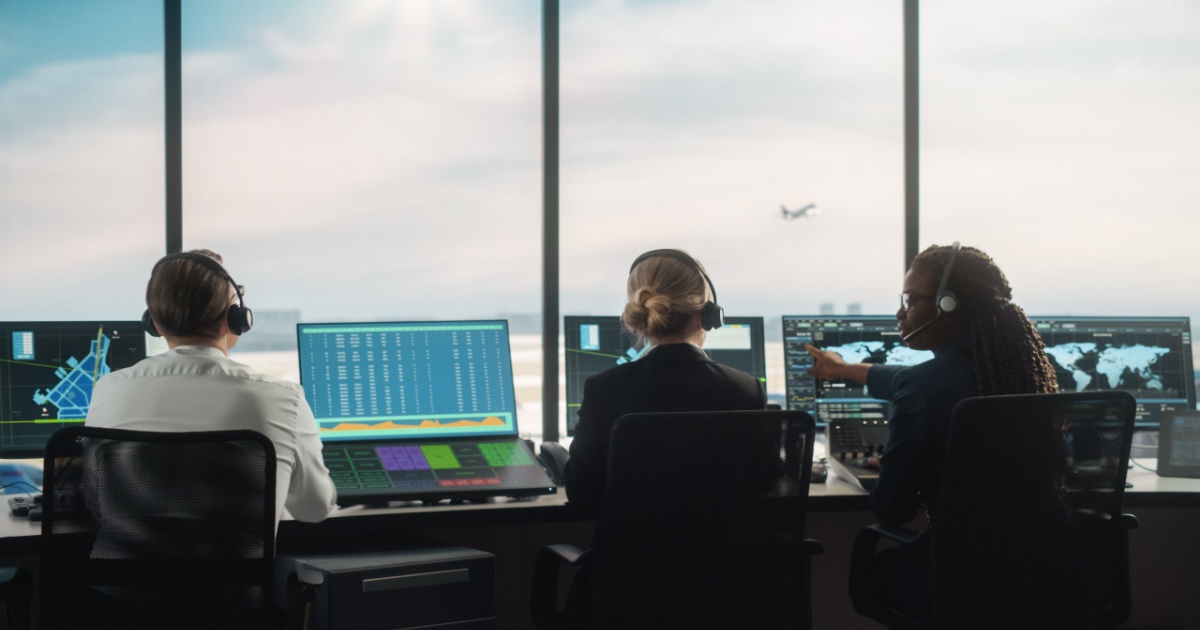AI-Driven Technology Takes Air Traffic Control to the Next Level

Artificial intelligence (AI) is proving to be the real deal when it comes to transforming the air traffic control sector. Although the shortage of controllers continues to impact the aviation industry, the latest cutting-edge AI technology is enhancing safety and efficiency while easing the stress of this highly intense occupation.
Air traffic control systems
There’s no denying that the job of an air traffic controller is intense. The main responsibility of this specialist is to keep everyone safe—both in the air and on the ground. With a multitude of critical responsibilities at hand at any one time, AI is proving to be a true game changer—especially with air travel on the rise.
Here are some of the ways in which AI is benefitting air traffic control and safety:
- Decision Support Systems—These systems are powered by AI to provide air traffic controllers with real-time data analysis and recommendations, which not only enhance their situational awareness but help them make more informed decisions.
- Automated Conflict Detection—This system utilizes AI to alert controllers of potential conflicts, while also suggesting maneuvers to prevent collisions by continuously monitoring aircraft positions.
- Traffic Prediction and Management—In this critical area of air traffic control (ATC), AI helps controllers make proactive decisions by analyzing large amounts of flight data. The most important points of this data include predicting air traffic patterns, optimizing flight routes and reducing congestion. Combined, this leads to fewer delays and increased safety.
- Predictive Maintenance—Using AI to analyze aircraft data helps predict maintenance needs before an issue arises, thus enhancing safety and reducing the chances of unexpected technical problems.
- Weather Forecasting—Applying AI models to anticipate weather conditions enables controllers to route flights more effectively and minimize situations where bad weather affects air travel.
- Voice Recognition and Assistance—This advanced AI-driven voice recognition system helps reduce the controller’s workload by transcribing and understanding pilot-controller communication. This maximizes efficiency in the tower since automating routine tasks like this allows controllers to focus on more critical matters.
In-flight operations
As safety is the top priority in aviation, manufacturers such as Boeing and Airbus are improving their aircraft by implementing AI-powered systems. Here is the latest rundown of these systems:
- Boeing’s Airplane Health Management system uses AI as a preemptive approach to predict potential maintenance issues before they become evident—all while monitoring the aircraft as it is in flight.
- Airbus’s Skywise is a digital platform system that uses AI to help optimize flight routes, reduce fuel consumption and improve overall operational efficiency by analyzing this critical in-flight data. The platform can even predict possible flight delays, not to mention enabling proactive measures to handle possible technical issues.
Are you interested in becoming an air traffic controller? As the air traffic controller shortage continues to grow, so does your chance to join this in-demand group of highly-skilled aviation professionals. Vaughn’s Air Traffic Control program can get you there. Apply today!

